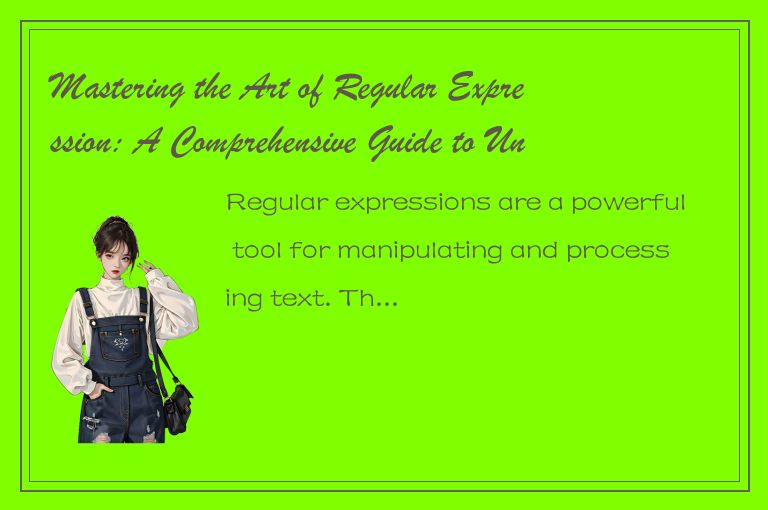Regular expressions are a powerful tool for manipulating and processing text. They are used in almost every programming language for tasks such as searching, replacing, and validating text. However, they can also be intimidating and difficult to learn. In this article, we will examine what regular expressions are, how they work, and provide some tips and tricks for using them effectively.

What are Regular Expressions?
A regular expression, or regex for short, is a pattern that specifies a set of strings. These patterns are composed of a combination of characters and meta-characters that define the rules for matching strings. For example, to match a phone number with the format (123) 456-7890, you could use the regular expression:
`^\(\d{3}\)\s\d{3}-\d{4}$`
The pattern `^` matches the beginning of the string, `\(` matches a literal open parenthesis, `\d{3}` matches three digits, `\)` matches a literal close parenthesis,`\s` matches a whitespace character, `\d{3}` matches three digits, `-` matches a literal hyphen,`\d{4}` matches four digits, and `$` matches the end of the string.
Regular expressions can also be used to match more complex patterns such as email addresses, URLs, and dates.
Basic Syntax
Regular expressions have a syntax that can seem cryptic at first. Here are some basic rules to keep in mind:
- Letters and digits match themselves.
- Special characters such as `.`, `*`, `+`, `?`, `{}`, `()`, `[]`, `^`, `$`, and `\` have special meanings and must be escaped with a backslash `\` to match themselves literally.
- Character classes such as `\d`, `\w`, and `\s` match specific sets of characters.
- Quantifiers such as `*`, `+`, and `?` specify how many times the previous character or group should be matched.
- Alternation with `|` matches any one of a set of alternatives.
- Grouping with `()` creates a subexpression that can be used for alternation and quantification.
Some examples of regular expressions using these rules are:
`\d{3}` matches any three digits, such as 123, 456, or 789.
`\w+` matches one or more word characters, such as "hello" or "123abc".
`[aeiou]` matches any one of the vowels a, e, i, o, or u.
`^\d{3}-\d{2}-\d{4}$` matches the format of a social security number, such as 123-45-6789.
Advanced Techniques
Regular expressions can be used for more than just matching simple patterns. Here are some advanced techniques that can be used to make regular expressions more powerful:
Lookarounds: Positive and negative lookarounds allow you to match a pattern only if a certain condition is or is not met. For example, `(?=expression)` matches the current position if it is followed by expression, and `(?!expression)` matches the current position if it is not followed by expression.
Backreferences: Backreferences allow you to match a subexpression that was already matched earlier in the pattern. For example, `(\w)\1` matches any two consecutive occurrences of the same word character.
Substitution: Regular expressions can be used for search-and-replace operations using the `s/old/new/` syntax. For example, `s/cat/dog/` replaces "cat" with "dog".
Performance Considerations
While regular expressions are a convenient and powerful tool, they can also be slow and resource-intensive. Here are some tips for improving the performance of regular expressions:
Use character classes: Character classes such as `\d`, `\w`, and `\s` are optimized for matching specific sets of characters and can be faster than using alternatives.
Avoid lookarounds: Lookarounds can be slower than other techniques because they require the engine to look ahead or behind in the string.
Use the minimum necessary: The more specific the regular expression, the faster it will be. Avoid using `.*`, which matches any character zero or more times.
Conclusion
Regular expressions are a powerful tool for manipulating and processing text. However, they can be difficult to master. By understanding the basic syntax, advanced techniques, and performance considerations, you can unlock the full power of regular expressions and take your programming skills to the next level.




 QQ客服专员
QQ客服专员 电话客服专员
电话客服专员